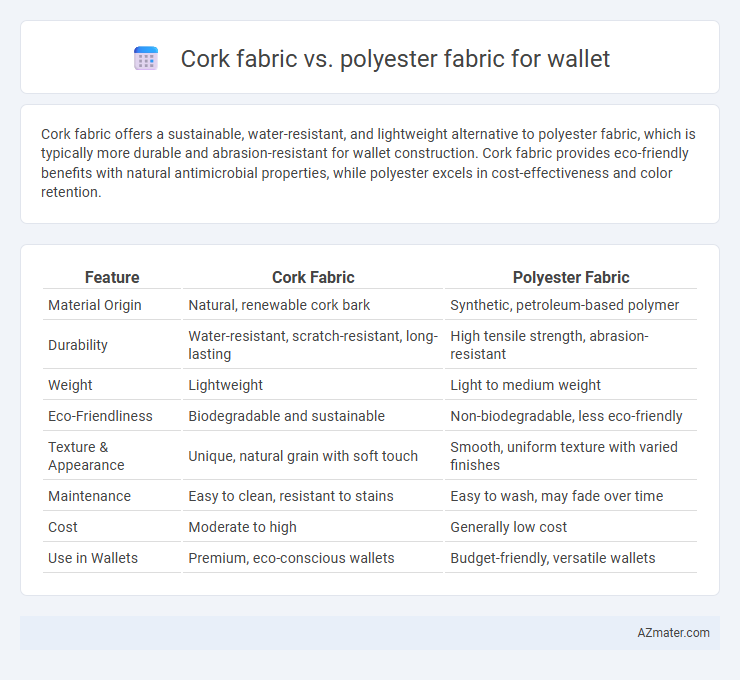Cork fabric offers a sustainable, water-resistant, and lightweight alternative to polyester fabric, which is typically more durable and abrasion-resistant for wallet construction. Cork fabric provides eco-friendly benefits with natural antimicrobial properties, while polyester excels in cost-effectiveness and color retention.
Table of Comparison
| Feature | Cork Fabric | Polyester Fabric |
|---|---|---|
| Material Origin | Natural, renewable cork bark | Synthetic, petroleum-based polymer |
| Durability | Water-resistant, scratch-resistant, long-lasting | High tensile strength, abrasion-resistant |
| Weight | Lightweight | Light to medium weight |
| Eco-Friendliness | Biodegradable and sustainable | Non-biodegradable, less eco-friendly |
| Texture & Appearance | Unique, natural grain with soft touch | Smooth, uniform texture with varied finishes |
| Maintenance | Easy to clean, resistant to stains | Easy to wash, may fade over time |
| Cost | Moderate to high | Generally low cost |
| Use in Wallets | Premium, eco-conscious wallets | Budget-friendly, versatile wallets |
Introduction to Cork Fabric and Polyester Fabric
Cork fabric, derived from the bark of the cork oak tree, is a sustainable and eco-friendly material prized for its lightweight, water-resistant, and biodegradable properties, making it an ideal choice for eco-conscious wallet designs. Polyester fabric, a synthetic polymer made from petrochemicals, offers durability, resistance to stretching and shrinking, and cost-effectiveness, widely used in wallet manufacturing for its versatility and affordability. Comparing these materials highlights cork fabric's natural, renewable appeal versus polyester's synthetic endurance and mass production benefits.
Material Origins and Sustainability
Cork fabric is derived from the bark of cork oak trees, a renewable resource harvested without harming the tree, making it an eco-friendly and biodegradable option for wallets. Polyester fabric is a synthetic material produced from petroleum-based products, which involves significant energy consumption and contributes to non-biodegradable plastic waste. Cork's natural origin and sustainable harvesting practices make it a more environmentally responsible choice compared to the petrochemical-based, less sustainable polyester fabric.
Wallet Durability: Cork vs. Polyester
Cork fabric offers high durability for wallets due to its natural resistance to water, abrasion, and tearing, making it an eco-friendly and resilient choice. Polyester fabric, known for its strong synthetic fibers, provides excellent durability with resistance to stretching, shrinking, and mildew but may not be as sustainable as cork. When durability is a priority, cork wallets combine longevity with biodegradability, while polyester wallets deliver enhanced strength suitable for frequent use in various conditions.
Environmental Impact Comparison
Cork fabric is a sustainable material harvested from the bark of cork oak trees without harming the tree, making it biodegradable, renewable, and carbon-neutral throughout its lifecycle. Polyester fabric, derived from petroleum-based synthetic fibers, contributes to environmental pollution due to non-biodegradability and microplastic shedding during washing. Choosing cork fabric for wallets significantly reduces ecological footprint by promoting renewable sourcing and minimizing plastic waste.
Aesthetic and Design Possibilities
Cork fabric offers a unique, natural texture and a matte finish that enhances wallets with an eco-friendly and artisanal aesthetic, while its pliability allows for creative embossing and customized patterns. Polyester fabric provides a smooth, uniform surface that supports vibrant colors, high-definition prints, and sleek designs, making it ideal for bold, modern wallets with precise detailing. Both materials enable distinct design possibilities, but cork's organic appeal contrasts with polyester's versatility in pattern and color application.
Water Resistance and Maintenance
Cork fabric offers superior water resistance compared to polyester fabric, effectively repelling moisture due to its natural waterproof properties, making it ideal for wallets exposed to wet conditions. Maintenance of cork wallets is minimal, requiring only occasional wiping with a damp cloth, while polyester wallets often need regular cleaning to prevent water stains and maintain appearance. Cork's durability combined with its eco-friendly nature provides a long-lasting, low-maintenance alternative to synthetic polyester fabrics in wallet manufacturing.
Comfort and Texture Differences
Cork fabric offers a natural, soft, and slightly textured surface that enhances the comfort of wallets by providing a lightweight and breathable feel. In contrast, polyester fabric is smoother and often stiffer, which can result in less comfort due to reduced flexibility and limited breathability. Cork's eco-friendly, hypoallergenic properties also contribute to a more pleasant tactile experience compared to synthetic polyester.
Cost and Market Availability
Cork fabric wallets offer sustainable and eco-friendly qualities with moderate pricing, typically ranging from $15 to $40, appealing to environmentally conscious consumers. Polyester fabric wallets are generally more affordable, priced between $5 and $25, benefiting from widespread production and easy market availability across global retail channels. The market for polyester wallets is larger due to mass manufacturing, while cork wallets target niche markets emphasizing durability and natural texture.
Allergen and Vegan Considerations
Cork fabric offers a hypoallergenic and naturally antimicrobial option ideal for wallets, minimizing skin irritation and allergic reactions, unlike polyester which can sometimes trigger sensitivities due to synthetic fibers. Cork is sustainably harvested from cork oak trees, making it a fully vegan alternative free from animal products, whereas polyester is a synthetic material derived from petrochemicals and also vegan but less eco-friendly. Choosing cork fabric enhances both allergen safety and ethical considerations, appealing to environmentally conscious and allergy-sensitive consumers.
Final Verdict: Which Fabric for Wallets?
Cork fabric offers eco-friendly durability and natural water resistance, making it an ideal choice for sustainable wallet production. Polyester fabric provides high abrasion resistance and vibrant color retention but lacks the breathable, biodegradable qualities of cork. For wallets seeking longevity with environmental benefits, cork fabric is the preferred material; polyester suits designs prioritizing cost-effectiveness and color customization.

Infographic: Cork fabric vs Polyester fabric for Wallet
 azmater.com
azmater.com